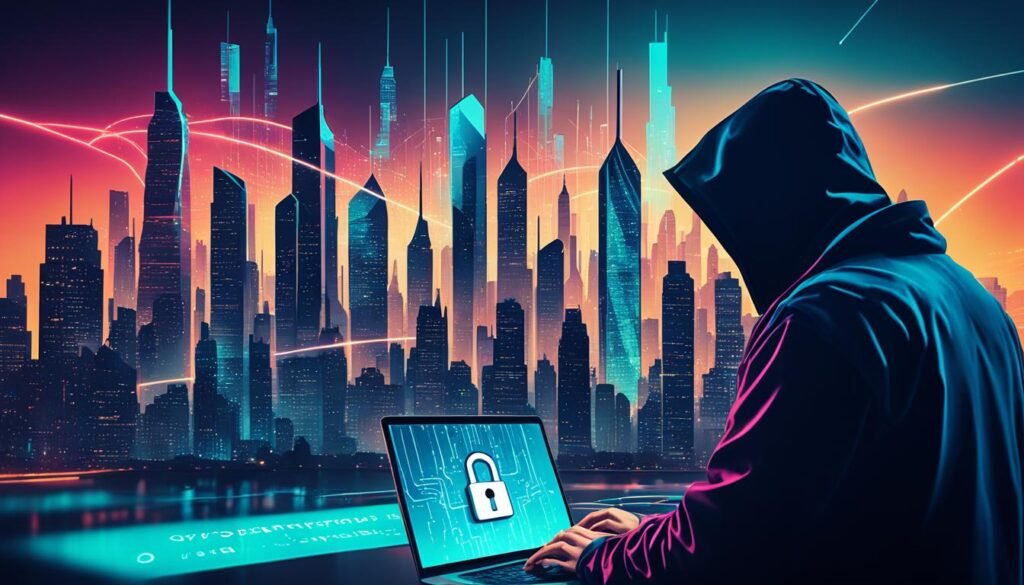In today’s world, cyber threats and data breaches are common. That’s why network security is so important. The virtual private network (VPN) is a key player in keeping our online communication safe. But what exactly does it do, and why is it vital for a secure internet connection?
VPNs are for everyone, not just tech experts or big companies. They’re crucial for anyone who cares about their online privacy and safety. With technologies like IPsec and SSL/TLS, VPNs help protect our data from threats.
As cyber threats grow more complex, we wonder: are all VPNs the same? Which one is safer? With more people working remotely, VPNs need to keep up. They must adapt to the needs of today’s mobile workers. This is why understanding VPNs is key in our connected world.
What is a Virtual Private Network (VPN)?
A Virtual Private Network, or VPN, is key for keeping internet use safe and private. It uses data encryption to make a secure network from the public internet. This hides users’ IP addresses, keeping their online actions safe from prying eyes. It’s vital for both personal and work use, especially when accessing sensitive data from afar.
Defining VPN in the Context of Network Security
VPNs do more than just unblock websites; they’re a basic security tool today. They use strong encryption like 256-bit AES through protocols like OpenVPN and WireGuard. This makes all internet data almost impossible to hack. For when data security is a top priority, using a VPN is a must in a multi-layered security plan.
How VPNs Safeguard Data Transmission
VPNs protect data by encrypting it. When a device connects to the internet with a VPN, the data gets encrypted first. This makes it unreadable to anyone without the right key. This data encryption is key to keeping online privacy, protecting digital info from hackers and spies.
The Role of VPN in Remote Work and Corporate Environments
Remote work is on the rise, making VPNs more important than ever. Companies use VPNs to give workers safe access to company networks from anywhere. This keeps work going and protects company data. VPNs make working from anywhere safer and more secure.
Understanding How VPNs Operate
VPNs use important parts of internet security and network security. They do this with advanced encryption and tunneling protocols. These tools help make internet connections safe and private. They lower the chance of data theft and cyber attacks.
The Technology Behind VPN Encryption
Encryption is key to VPNs, making data safe on public networks. It encrypts data at the start and decrypts it at the end. This keeps sensitive info safe from prying eyes and unauthorized access.
VPNs use strong encryption methods like RSA and AES. These algorithms change readable data into a secret code. Only the right decryption key can turn it back into readable data, keeping data safe and private.
Tunneling Protocols Explained
Tunneling protocols are vital for VPNs, making sure data travels securely. Protocols like PPTP, L2TP, SSTP, and OpenVPN create secure tunnels. They wrap data packets in a way that makes them look like they’re in a private network, even when they’re not.
- PPTP: Fast and easy to set up, but not as secure as newer options.
- L2TP/IPsec: A strong combo that uses L2TP for tunneling and IPsec for encryption.
- SSTP: Uses SSL/TLS encryption for top-level security and wide compatibility.
- OpenVPN: A favorite for its high security, reliability, and flexibility, using SSL/TILS.
Knowing about VPN encryption and tunneling is key for those looking to boost their internet security and network security. VPNs protect data from unauthorized access and keep it private. This makes online interactions and communications safer.
The Importance of Secure Internet Connections
In today’s digital world, having a secure internet connection is essential. Cyber threats are always changing. That’s why a good VPN service is key to keeping your information safe and your online activities private.
Threats Mitigated by Using VPNs
A strong VPN service offers many ways to keep your internet safe. It fights against malware by checking all downloads and cleaning files to remove bad stuff. This stops devices from getting infected.
Also, VPNs protect against phishing protection by using smart technology to spot and block fake websites. This means you’re less likely to fall for phishing scams and lose sensitive info.
VPNs help you browse the web anonymously by hiding your IP address. They also stop hackers from stealing your login info. This is important because hackers often try to guess your login details.
Enhancing Online Privacy Through VPNs
VPNs do more than just hide your online activities. They protect your privacy by using strong encryption. This keeps your personal and company data safe from prying eyes.
With more people working remotely, VPNs are a must for safe and easy access to the internet. They’re especially important for following laws like GDPR, which protect your online privacy.
Using a good VPN service does more than just make your internet connection safer. It also helps you stay anonymous online and keeps your data safe from cyber threats.
Advantages of Employing a VPN Service
Every modern business and internet user can gain from a VPN service. A secure internet connection is key, and VPNs add a vital security layer. They help keep sensitive data safe and maintain network security.
Using a VPN gives businesses remote access to their network. This is crucial for work-from-home setups. It lets employees securely reach important resources from anywhere. This boosts productivity and keeps data safe.
VPNs cut down on support costs by avoiding the need for expensive servers. Companies save money by using a VPN’s strong network. VPNs also stop internet service providers from slowing down your internet, which is key for heavy data use.
- Up to 256-bit AES encryption secures all online activities, providing high-level security.
- Simultaneous access for multiple users upholds productivity while saving on the cost and effort needed to set up individual secure connections.
- Adaptable to new devices and changes in network configuration, making them ideal for growing businesses.
But, not all VPNs are the same. Problems like dropped connections and setup issues can happen. Some websites might block VPNs, and not all providers are reliable. Users should check the provider’s policies to avoid legal issues and privacy concerns.
Now, about 31% of Internet users worldwide use VPNs. This shows how important VPNs are today. For both companies and individuals, using a VPN can boost network security, improve remote access, and keep the internet connection secure.
Different Types of VPN Configurations
In today’s digital world, knowing about VPN types is key for better internet security and strong corporate network security. VPNs are vital for secure communication, whether for work from home or linking business networks.
Remote Access VPNs for Individuals
Remote access VPNs are great for people working from anywhere or traveling. They let you connect to your work network safely from anywhere with an internet connection. This means you can work securely and easily, just like you’re in the office.
Site-to-Site VPNs for Business Networks
Site-to-site VPNs are perfect for big companies with offices in different places. They connect these offices together securely. This creates a safe network that keeps data safe everywhere, making corporate network security top-notch.
Both remote and site-to-site VPNs are crucial for protecting data and giving secure access to important online resources. As online threats grow, VPNs become even more important for keeping data safe and giving peace of mind to both people and companies.
Improving Internet Security with Data Encryption

In today’s digital world, keeping our online privacy safe is key. Data encryption is a top way to do this. It keeps sensitive info safe from prying eyes and makes sure it stays secure while traveling over the internet.
The Levels of Security Provided by VPN Protocols
VPN protocols are key in making the internet safer. They use strong encryption to protect data. Protocols like IPsec and SSL/TLS make safe tunnels for data. WireGuard is even better, offering fast speeds and top-notch security for everyone.
Confidentiality, Integrity, and Authentication in VPNs
VPN’s must keep data secret, whole, and real. Encryption keeps data safe from others. Checks for data changes make sure it’s not messed with. And, making sure who you’re talking to stops hackers from getting in.
Network Security: The Critical Role of VPNs
In today’s digital world, network security is very important. This is especially true for the growth and power of a virtual private network (VPN). VPNs help secure remote connections and make safe browsing on public networks. They are key to modern cybersecurity.
VPNs started to help secure distant networks. Now, they do more than just connect people. They create secure tunnels, encrypt data, and hide IP addresses. This keeps sensitive info safe from others.
- VPNs protect secure internet connections by keeping data safe from being intercepted on less secure networks.
- They use encryption like IPSec and SSL/TLS to protect data moving between the network and users from cyber threats.
- With more people working remotely, VPNs let employees safely access company resources from anywhere, not just the office.
VPNs do more than just the basics of security. They use strong encryption like 256-bit to fight cyberattacks, which happen every 39 seconds. They also help with cybersecurity plans like the Zero Trust model, which checks and controls access to IT networks.
But, with new internet encryption, relying only on VPNs isn’t enough. Businesses need a full security plan. VPNs should be part of a mix of security steps.
In summary, as we use more public Wi-Fi and face new cyber threats, VPNs are more important than ever. They offer features like automatic kill switches, no-logs policies, and can get past geo-restrictions. They are key to protecting data, improving privacy, and meeting global security standards.
VPN Security Mechanisms and Authentication Methods
In today’s digital world, keeping our online privacy safe is crucial. VPNs (Virtual Private Networks) boost security by using strong encryption and authentication methods. This makes our online communications secure and private.
Understanding the VPN Security Model
VPN technology uses strong security measures to protect our data. It uses end-to-end encryption to make sure data is only readable by the intended person. Protocols like IPsec and L2TP also help secure data as it travels across the internet.
These technologies work with dynamic authentication methods to keep VPNs safe. This stops unauthorized access. Cryptobinding technology also helps by checking connection authenticity, protecting against “Man in the Middle” attacks.
Authentication Techniques for Secure VPN Access
Authentication is key in VPNs to make sure users are who they say they are. There are many ways to do this, from simple passwords to complex hardware tokens. These methods make sure only the right people get in and help keep our online privacy safe.
- Password-based Authentication: This uses a secret password to let people in.
- Certificate-based Authentication: This method uses digital certificates and public and private keys for extra security.
- Token-based Authentication: This requires devices or apps to make one-time passwords, making it harder for others to get in.
Server validation lets admins adjust their security settings. This affects both network security and privacy. With features like Fast Reconnect and customizable UWP VPN plug-ins, businesses can make their VPNs fit their needs. This ensures secure and smooth user access.
By combining different authentication methods with strong VPN security, we can be sure of our safety online. It’s important to have these measures in place to protect our privacy and security in our digital lives.
Exploring the Most Secure VPN Protocols
In today’s fast-evolving cyber landscape, VPN protocols are key to internet security. They set the rules for how data moves securely over the internet. Each protocol has its own way of encrypting data and protecting it. We look into the top protocols that protect users’ online activities, focusing on their encryption, security features, and how well they keep digital footprints safe.
IPsec and SSL/TLS: Foundations of VPN Security
IPsec, paired with L2TP, makes a strong security team, better than old protocols like PPTP. L2TP/IPsec is more secure than before, but it can be weak in the public key exchange. SSL/TLS, on the other hand, is key to the Secure Socket Tunneling Protocol (SSTP), making data encryption strong with AES encryption. But, SSTP’s use of proprietary infrastructure could bring new security risks. IPsec and SSL/TLS are solid bases for VPN security, showing the balance between being easy to use and being very secure.
Assessing the Strength of WireGuard, OpenVPN, and IKEv2 Protocols
WireGuard is a top choice in VPNs, known for its simple design that doesn’t slow down your internet. It’s great for heavy internet use like online gaming and streaming, giving users a smooth experience with little delay. OpenVPN is known for being stable and reliable, using the OpenSSL library to support many encryption types, including AES-256. While OpenVPN can get past many firewalls, WireGuard is faster in connecting.
IKEv2/IPsec is praised for being stable and quick to reconnect on mobile devices, especially for iOS users who want a reliable VPN across devices. ProtonVPN’s Secure Core is a big step forward in VPNs, sending traffic through servers in countries that value privacy, but it might be slower. WireGuard, OpenVPN, and IKEv2/IPsec show the latest in VPN technology, each with unique benefits for different users, making them key in internet security.


